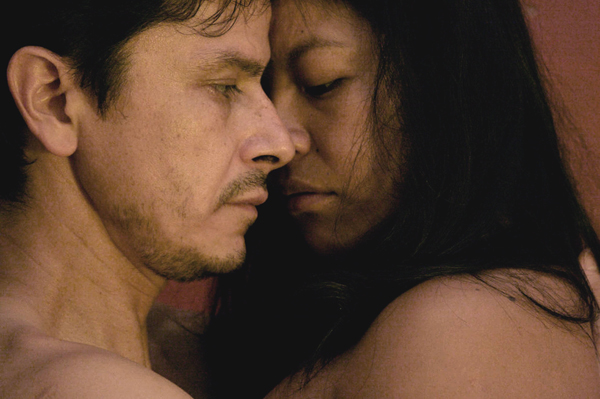|
Reviews of Recent Independent, Foreign, & Documentary Films in Theaters and DVD/Home Video
 LEAP YEAR (AÑO BISIESTO) The challenge in reviewing the Mexican psychological sex drama Leap Year (Año Bisiesto) is to remain circumspect, and not out of a knee-jerk reaction to spoilers. This film challenges the viewer, daring you to look away while wondering whether what you’re seeing is simulated or a case of actors giving it all—and I mean all. Australian-born director Matthew Rowe's first feature film sets out to shock, or at the least, disturb. What passes as a storyline is simple enough. Laura, 25 years old and originally from Oaxaca, works as a freelance writer from her simple, sparsely furnished Mexico City apartment. On some nights, she pulls her hair up in a ponytail and carefully puts on make-up and returns home later with a man—during the course of the film there will be three pick-ups. Have no doubts, you are a voyeur, privy to the commonplace and nocturnal vignettes of Laura’s life. Her routine becomes apparent: the spying through the window on a neighboring couple and the crossing off of the days on the calendar—yes, it’s a February with that one extra day. Without much in the way of dialogue, actions are everything, like when a one-night stand creeps out in the early morning without a kiss or a goodbye. Though the overall tone’s unsentimental, an almost-sweet respite takes place between Laura and the older, lighter-skinned Arturo (an equally game Gustavo Sánchez Parra), her third pick up and an aspiring actor. It’s reassuring (and more than a relief) to see her curled up on a sofa next to him with her head in his lap, laughing and relaxed, especially after what has gone in the bedroom, where Laura’s views of sex and intimacy stray from the conventional. It’s not because of the amount of sex and nudity that the word “daring” comes to mind in describing Mónica del Carmen’s performance, a combination of subtle vulnerability and abandonment. (When was the last time you’ve seen a lead actress pick her nose on camera?) Almost as though it’s invading her privacy, the camera films her penetratingly, ahem, up close. You can’t help but feel some connection to her. Del Carmen’s so relaxed in front of the camera that an unsuspecting viewer might think the film’s a documentary rather than what it is, a film held together by a bravura performance. Laura putters her apartment about wearing frumpy pajamas, but when she finds out that Arturo will soon arrive, she lights up, shedding her clothes as if it was part of a fire drill, and becoming like a completely different person. (Julia Roberts certainly has a point—“To act with my clothes on is a performance; to act with my clothes off is a documentary.” That’s certainly the effect here.) However, there’s a limit to this type elliptical of filmmaking when it comes to fully grasping Laura in more than a superficial way. We are left with clues, but not answers, to explain her behavior. Michael Haneke’s The Piano Teacher (2001) also centered on a woman who embraces what some would call degradation. Both films are intense and disquieting. But if the latter is overwritten, Leap Year is more like a sketch with a series of connect-the-dots shocks. After nearly 90 minutes of exposure to Laura, our understanding of her motivations amounts to a pop psychology diagnosis. If I were to reveal too much about what happens between her and Arturo, your post-screening reaction would likely be “Is that all there is?” Heads
up: the film’s poster, dominated by del Carmen’s nude, reclining body
underneath a man, also apparently naked, standing above her, does the
film a disservice. It implies a sensual, soft-core rendezvous—but
erotica it ain’t. Rowe films the sex scenes unflinchingly, not under the
most flattering light and not always to the advantage of the actors’
vanity.
Kent Turner
|

